音频文字同步学--美语怎么说(2)
- 格式:pdf
- 大小:5.70 MB
- 文档页数:13
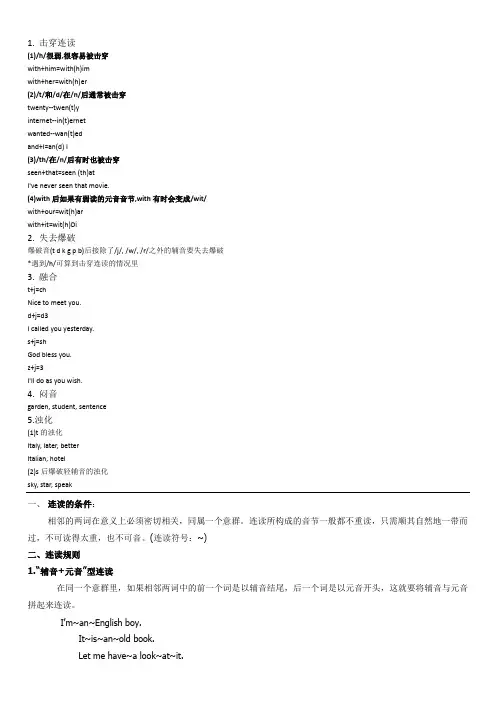
1. 击穿连读(1)/h/很弱,很容易被击穿with+him=with(h)imwith+her=with(h)er(2)/t/和/d/在/n/后通常被击穿twenty--twen(t)yinternet--in(t)ernetwanted--wan(t)edand+I=an(d) I(3)/th/在/n/后有时也被击穿seen+that=seen (th)atI've never seen that movie.(4)with后如果有弱读的元音音节,with有时会变成/wit/with+our=wit(h)arwith+it=wit(h)Di2. 失去爆破爆破音(t d k g p b)后接除了/j/, /w/, /r/之外的辅音要失去爆破*遇到/h/可算到击穿连读的情况里3. 融合t+j=chNice to meet you.d+j=d3I called you yesterday.s+j=shGod bless you.z+j=3I'll do as you wish.4. 闷音garden, student, sentence5.浊化(1)t的浊化Italy, later, betterItalian, hotel(2)s后爆破轻辅音的浊化sky, star, speak一、连读的条件:相邻的两词在意义上必须密切相关,同属一个意群。
连读所构成的音节一般都不重读,只需顺其自然地一带而过,不可读得太重,也不可音。
(连读符号:~)二、连读规则1.“辅音+元音”型连读在同一个意群里,如果相邻两词中的前一个词是以辅音结尾,后一个词是以元音开头,这就要将辅音与元音拼起来连读。
I’m~an~English boy.It~is~an~old book.Let me have~a look~at~it.Ms Black worked in~an~office last~yesterday.I called~you half~an~hour~ago.Put~it~on, please.Not~at~all.Please pick~it~up.2.“r/re+元音”型连读如果前一个词是以-r或者-re结尾,后一个词是以元音开头,这时的r或re不但要发/r/,而且还要与后面的元音拼起来连读。
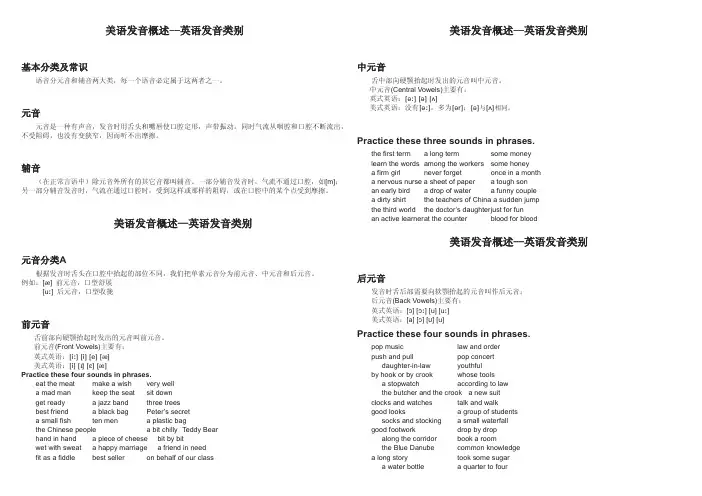
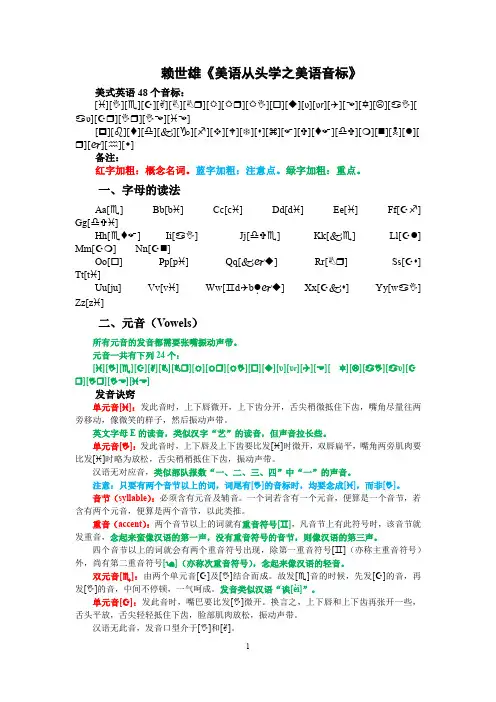
赖世雄《美语从头学之美语音标》美式英语48个音标:[♓][✋][♏][☪][✌][ ][ ❒][ ][ ❒][ ✋][☐][◆][υ][υr][✈][☜][✡][☹][♋✋][♋υ][☪❒][✋❒][✋☜][♓☜][☐][♌][♦][♎][ ][♑][♐][ ][ ][❆][♦][ ][☞][✞][♦☞][♎✞][❍][⏹][☠][●][❒][ ][♒][♦]备注:红字加粗:概念名词。
蓝字加粗:注意点。
绿字加粗:重点。
一、字母的读法Aa[♏] Bb[b♓] Cc[c♓] Dd[d♓] Ee[♓] Ff[☪♐] Gg[♎✞♓]Hh[♏♦☞] Ii[♋✋] Jj[♎✞♏] Kk[ ♏] Ll[☪●] Mm[☪❍] Nn[☪⏹]Oo[☐] Pp[p♓] Qq[ ◆] Rr[ ❒] Ss[☪♦] Tt[t♓]Uu[ju] Vv[v♓] Ww[♊d✈b●. ◆] Xx[☪♦] Yy[w♋✋] Zz[z♓]二、元音(Vowels)所有元音的发音都需要张嘴振动声带。
元音一共有下列24个:[♓][✋][♏][☪][✌][ ][ ❒][ ][ ❒][ ✋][☐][◆][υ][υr][✈][☜][ ✡][☹][♋✋][♋υ][☪❒][✋❒][✋☜][♓☜]发音诀窍单元音[♓]:发此音时,上下唇微开,上下齿分开,舌尖稍微抵住下齿,嘴角尽量往两旁移动,像微笑的样子,然后振动声带。
英文字母E的读音,类似汉字“艺”的读音,但声音拉长些。
单元音[✋]:发此音时,上下唇及上下齿要比发[♓]时微开,双唇扁平,嘴角两旁肌肉要比发[♓]时略为放松,舌尖稍稍抵住下齿,振动声带。
汉语无对应音,类似部队报数“一、二、三、四”中“一”的声音。
注意:只要有两个音节以上的词,词尾有[✋]的音标时,均要念成[♓],而非[✋]。
音节(syllable):必须含有元音及辅音。
一个词若含有一个元音,便算是一个音节,若含有两个元音,便算是两个音节,以此类推。
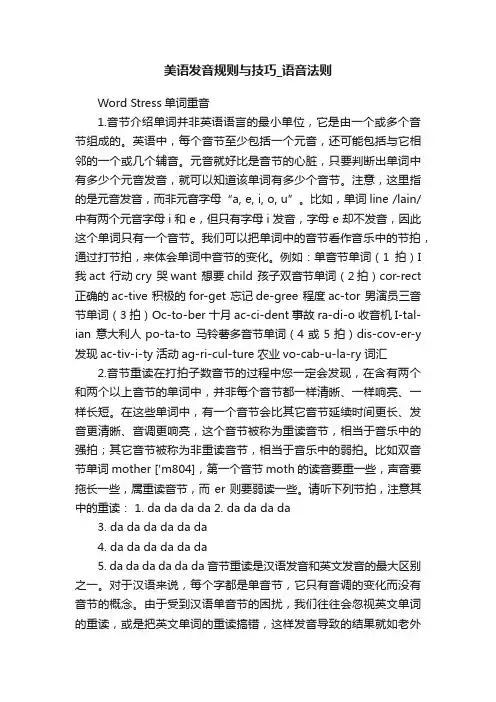
美语发音规则与技巧_语音法则Word Stress单词重音1.音节介绍单词并非英语语言的最小单位,它是由一个或多个音节组成的。
英语中,每个音节至少包括一个元音,还可能包括与它相邻的一个或几个辅音。
元音就好比是音节的心脏,只要判断出单词中有多少个元音发音,就可以知道该单词有多少个音节。
注意,这里指的是元音发音,而非元音字母“a, e, i, o, u”。
比如,单词line /lain/中有两个元音字母i和e,但只有字母i发音,字母e却不发音,因此这个单词只有一个音节。
我们可以把单词中的音节看作音乐中的节拍,通过打节拍,来体会单词中音节的变化。
例如:单音节单词(1拍)I 我act 行动cry 哭want 想要child 孩子双音节单词(2拍)cor-rect 正确的ac-tive 积极的for-get 忘记de-gree 程度ac-tor 男演员三音节单词(3拍)Oc-to-ber 十月ac-ci-dent 事故ra-di-o 收音机I-tal-ian 意大利人po-ta-to 马铃薯多音节单词(4或5拍)dis-cov-er-y 发现ac-tiv-i-ty 活动ag-ri-cul-ture 农业vo-cab-u-la-ry 词汇2.音节重读在打拍子数音节的过程中您一定会发现,在含有两个和两个以上音节的单词中,并非每个音节都一样清晰、一样响亮、一样长短。
在这些单词中,有一个音节会比其它音节延续时间更长、发音更清晰、音调更响亮,这个音节被称为重读音节,相当于音乐中的强拍;其它音节被称为非重读音节,相当于音乐中的弱拍。
比如双音节单词mother ['m804],第一个音节moth的读音要重一些,声音要拖长一些,属重读音节,而er则要弱读一些。
请听下列节拍,注意其中的重读: 1. da da da da 2. da da da da3. da da da da da da4. da da da da da da5. da da da da da da音节重读是汉语发音和英文发音的最大区别之一。
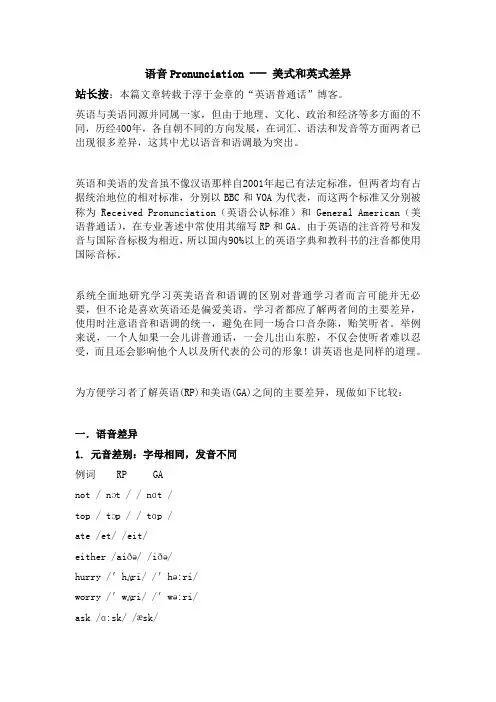
语音Pronunciation --- 美式和英式差异站长按:本篇文章转载于淳于金章的“英语普通话”博客。
英语与美语同源并同属一家,但由于地理、文化、政治和经济等多方面的不同,历经400年,各自朝不同的方向发展,在词汇、语法和发音等方面两者已出现很多差异,这其中尤以语音和语调最为突出。
英语和美语的发音虽不像汉语那样自2001年起已有法定标准,但两者均有占据统治地位的相对标准,分别以BBC和VOA为代表,而这两个标准又分别被称为Received Pronunciation(英语公认标准)和 General American(美语普通话),在专业著述中常使用其缩写RP和GA。
由于英语的注音符号和发音与国际音标极为相近,所以国内90%以上的英语字典和教科书的注音都使用国际音标。
系统全面地研究学习英美语音和语调的区别对普通学习者而言可能并无必要,但不论是喜欢英语还是偏爱美语,学习者都应了解两者间的主要差异,使用时注意语音和语调的统一,避免在同一场合口音杂陈,贻笑听者。
举例来说,一个人如果一会儿讲普通话,一会儿出山东腔,不仅会使听者难以忍受,而且还会影响他个人以及所代表的公司的形象!讲英语也是同样的道理。
为方便学习者了解英语(RP)和美语(GA)之间的主要差异,现做如下比较:一.语音差异1. 元音差别:字母相同,发音不同例词 RP GAnot / nɔt / / nɑt /top / tɔp / / tɑp /ate /et/ /eit/either /aiðə/ /iðə/hurry /'hʌri/ /'hə:ri/worry /'wʌri/ /'wə:ri/ask /ɑ:sk/ /æsk/can’t /kɑ:nt/ /kænt/chance /tʃɑ:ns/ /tʃæns/class /klɑ:s/ /klæs/hero /'hiərəu/ /'hi:rəu/during /'djuəriŋ/ /'dju:riŋ/tomato /tə'mɑ:təu/ /tə'meitəu/epoch /'i:pɔk/ /'epək/mobile /'məubail/ /'məubil/missile /'misail/ /'misil/lever /'li:və/ /'levər/2. 辅音差别:RP清晰,GA含混例词 RP GA understand /,ʌndə'stænd/ /,ʌndə'stænd/ writer /'raitə/ /'raitər/3.重音差别:主次重音不同,多无规律例词 RP GAdonate /dəu'neit/ /'dəuneit/migrate /mai'ɡreit/ /'maiɡreit/commentary /'kɔməntri/ /'kɔmən,təri/ secretary /'sekrətri/ /'sekrə,təri/ 4. 字母r的差别例词 RP GAworker /'wə:kə/ /'wərkər/father /'fɑ:ðə/ /'fɑrðər/farm /fɑ:m/ /fɑ:rm/far /fɑ:/ / fɑ:r/beer /biə/ / bir/bear /beə/ /ber/poor /puə/ /pur/air /εə/ /εər/在GA中,只要字母r出现,不论在元音前还是元音后都发音,而且是明显的卷舌音。
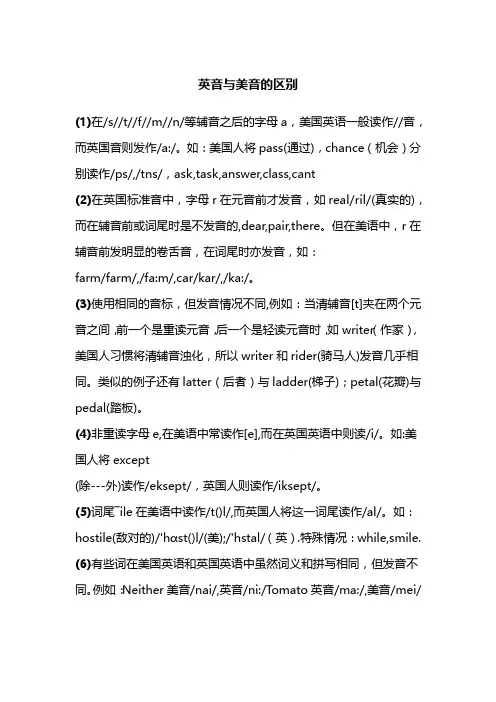
英音与美音的区别(1)在/s//t//f//m//n/等辅音之后的字母a,美国英语一般读作//音,而英国音则发作/a:/。
如:美国人将pass(通过),chance(机会)分别读作/ps/,/tns/,ask,task,answer,class,cant(2)在英国标准音中,字母r在元音前才发音,如real/ril/(真实的),而在辅音前或词尾时是不发音的,dear,pair,there。
但在美语中,r在辅音前发明显的卷舌音,在词尾时亦发音,如:farm/farm/,/fa:m/,car/kar/,/ka:/。
(3)使用相同的音标,但发音情况不同,例如:当清辅音[t]夹在两个元音之间,前一个是重读元音,后一个是轻读元音时,如writer(作家),美国人习惯将清辅音浊化,所以writer和rider(骑马人)发音几乎相同。
类似的例子还有latter(后者)与ladder(梯子);petal(花瓣)与pedal(踏板)。
(4)非重读字母e,在美语中常读作[e],而在英国英语中则读/i/。
如:美国人将except(除---外)读作/eksept/,英国人则读作/iksept/。
(5)词尾―ile在美语中读作/t()l/,而英国人将这一词尾读作/al/。
如:hostile(敌对的)/'hɑst()l/(美);/'hstal/(英).特殊情况:while,smile.(6)有些词在美国英语和英国英语中虽然词义和拼写相同,但发音不同。
例如:Neither美音/nai/,英音/ni:/Tomato英音/ma:/,美音/mei/(7)当字母O在单词里发为//音时,在美语中则读成/ɑ/。
例如:got英/ɡt/美/ɡɑt/dotor英/'dkt(r)/美/'dɑkt r/但当字母O后有字母ng时,或者前面的辅音为/f//θ//s/时,英美发音一样(8)重读元音/i////u//ɑ//ɑ/出现在/r/音前时,英音读法要加//音再读/r/音及其以后的音,而在美音中则不加//音。
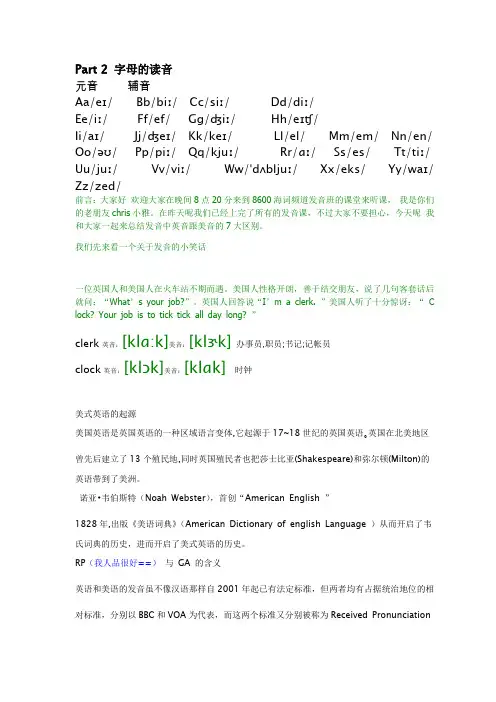
Part 2 字母的读音元音辅音Aa/eɪ/ Bb/biː/ Cc/siː/ Dd/diː/Ee/iː/ Ff/ef/ Gg/ʤiː/ Hh/eɪʧ/Ii/aɪ/ Jj/ʤeɪ/ Kk/keɪ/ Ll/el/ Mm/em/ Nn/en/ Oo/əʊ/ Pp/piː/ Qq/kjuː/ Rr/ɑː/ Ss/es/ Tt/tiː/ Uu/juː/ Vv/viː/ Ww/ˈdʌbljuː/Xx/eks/ Yy/waɪ/ Zz/zed/前言:大家好欢迎大家在晚间8点20分来到8600海词频道发音班的课堂来听课,我是你们的老朋友chris小雅。
在昨天呢我们已经上完了所有的发音课,不过大家不要担心,今天呢我和大家一起来总结发音中英音跟美音的7大区别。
我们先来看一个关于发音的小笑话一位英国人和美国人在火车站不期而遇。
美国人性格开朗,善于结交朋友,说了几句客套话后就问:“What’s your job?”。
英国人回答说“I’m a clerk. ”美国人听了十分惊讶:“C lock? Your job is to tick tick all day long? ”clerk英音:[klɑ:k]美音:[klɝk]办事员,职员;书记;记帐员clock英音:[klɔk]美音:[klɑk]时钟美式英语的起源美国英语是英国英语的一种区域语言变体,它起源于17~18世纪的英国英语。英国在北美地区曾先后建立了13个殖民地,同时英国殖民者也把莎士比亚(Shakespeare)和弥尔顿(Milton)的英语带到了美洲。
诺亚•韦伯斯特(Noah Webster),首创“American English ”1828年,出版《美语词典》(American Dictionary of english Language )从而开启了韦氏词典的历史,进而开启了美式英语的历史。
RP(我人品很好==)与GA 的含义英语和美语的发音虽不像汉语那样自2001年起已有法定标准,但两者均有占据统治地位的相对标准,分别以BBC和VOA为代表,而这两个标准又分别被称为Received Pronunciation(英语公认标准)和General American(美语普通话),在专业著述中常使用其缩写RP和G A。
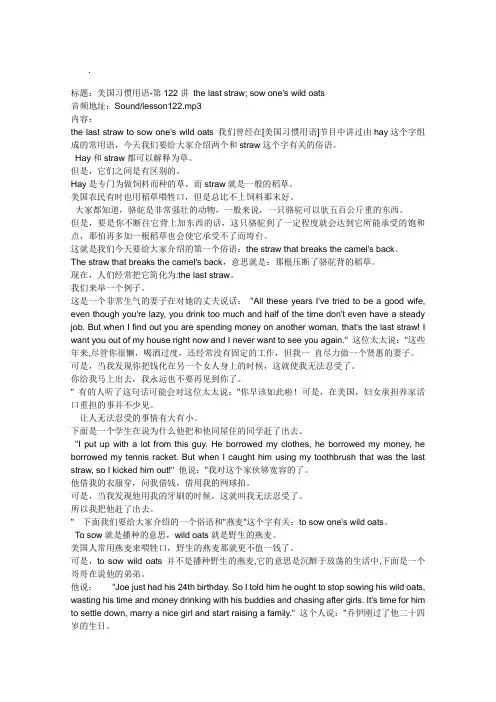
.标题:美国习惯用语-第122讲the last straw; sow one's wild oats音频地址:Sound/lesson122.mp3内容:the last straw to sow one's wild oats 我们曾经在[美国习惯用语]节目中讲过由hay这个字组成的常用语,今天我们要给大家介绍两个和straw这个字有关的俗语。
Hay和straw都可以解释为草。
但是,它们之间是有区别的。
Hay是专门为做饲料而种的草,而straw就是一般的稻草。
美国农民有时也用稻草喂牲口,但是总比不上饲料那末好。
大家都知道,骆驼是非常强壮的动物,一般来说,一只骆驼可以驮五百公斤重的东西。
但是,要是你不断往它背上加东西的话,这只骆驼到了一定程度就会达到它所能承受的饱和点,那怕再多加一根稻草也会使它承受不了而垮台。
这就是我们今天要给大家介绍的第一个俗语:the straw that breaks the camel's back。
The straw that breaks the camel's back,意思就是:那根压断了骆驼背的稻草。
现在,人们经常把它简化为:the last straw。
我们来举一个例子。
这是一个非常生气的妻子在对她的丈夫说话:"All these years I've tried to be a good wife, even though you're lazy, you drink too much and half of the time don't even have a steady job. But when I find out you are spending money on another woman, that's the last straw! I want you out of my house right now and I never want to see you again." 这位太太说:"这些年来,尽管你很懒,喝酒过度,还经常没有固定的工作,但我一直尽力做一个贤惠的妻子。
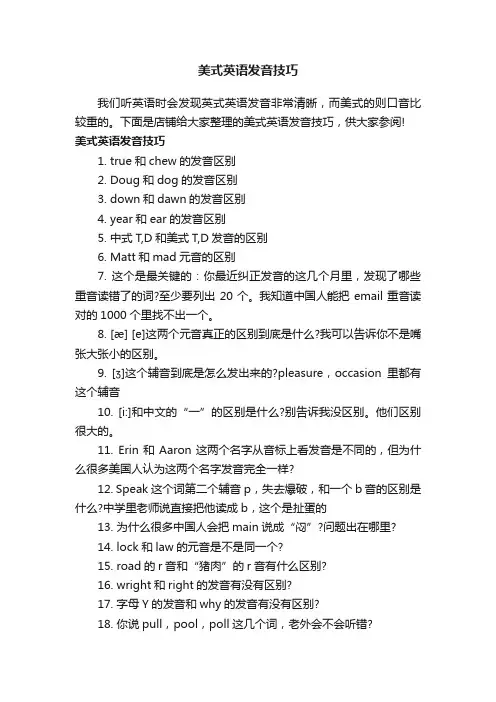
美式英语发音技巧我们听英语时会发现英式英语发音非常清晰,而美式的则口音比较重的。
下面是店铺给大家整理的美式英语发音技巧,供大家参阅! 美式英语发音技巧1. true和chew的发音区别2. Doug和dog的发音区别3. down和dawn的发音区别4. year和ear的发音区别5. 中式T,D和美式T,D发音的区别6. Matt和mad元音的区别7. 这个是最关键的:你最近纠正发音的这几个月里,发现了哪些重音读错了的词?至少要列出20个。
我知道中国人能把email重音读对的1000个里找不出一个。
8. [æ] [e]这两个元音真正的区别到底是什么?我可以告诉你不是嘴张大张小的区别。
9. [ʒ]这个辅音到底是怎么发出来的?pleasure,occasion里都有这个辅音10. [i:]和中文的“一”的区别是什么?别告诉我没区别。
他们区别很大的。
11. Erin和Aaron这两个名字从音标上看发音是不同的,但为什么很多美国人认为这两个名字发音完全一样?12. Speak这个词第二个辅音p,失去爆破,和一个b音的区别是什么?中学里老师说直接把他读成b,这个是扯蛋的13. 为什么很多中国人会把main说成“闷”?问题出在哪里?14. lock和law的元音是不是同一个?15. road的r音和“猪肉”的r音有什么区别?16. wright和right的发音有没有区别?17. 字母Y的发音和why的发音有没有区别?18. 你说pull,pool,poll这几个词,老外会不会听错?美式英语发音方法首先,美式发音中的r,是一个标志。
在美语中,字母R就从来没有不发音的。
而在英式英语,澳洲英语中常常是不震动声带发音的。
在美式发音中,字母R相当一个卷舌音的发音标志。
它在下面几种情况下会出现:第一,当字母R出现在最后一个字母位置的时候,要发卷舌音。
比如:teacher,car,four第二,当字母R的后面紧跟一个辅音字母的时候,这里的R要发音/r/,比如heard,learn美式发音中的第二个特征,是关于美式浊化音。
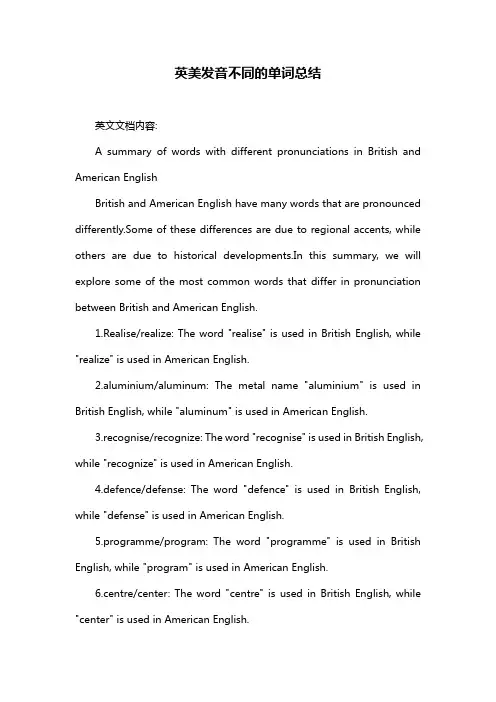
英美发音不同的单词总结英文文档内容:A summary of words with different pronunciations in British and American EnglishBritish and American English have many words that are pronounced differently.Some of these differences are due to regional accents, while others are due to historical developments.In this summary, we will explore some of the most common words that differ in pronunciation between British and American English.1.Realise/realize: The word "realise" is used in British English, while "realize" is used in American English.2.aluminium/aluminum: The metal name "aluminium" is used in British English, while "aluminum" is used in American English.3.recognise/recognize: The word "recognise" is used in British English, while "recognize" is used in American English.4.defence/defense: The word "defence" is used in British English, while "defense" is used in American English.5.programme/program: The word "programme" is used in British English, while "program" is used in American English.6.centre/center: The word "centre" is used in British English, while "center" is used in American English.7.aluminium/aluminum: The metal name "aluminium" is used in British English, while "aluminum" is used in American English.8.-ise/-ize: In British English, words often end with "-ise"(e.g."advertise", "organise"), while in American English, they often end with "-ize" (e.g."advertize", "organize").9."O" sound: The "O" sound is often longer in British English (e.g."no" is pronounced as "noh") compared to American English (e.g."no" is pronounced as "noo").10."A" sound: The "A" sound is often shorter in British English(e.g."cat" is pronounced as "kat") compared to American English (e.g."cat" is pronounced as "cah").These are just a few examples of the words that differ in pronunciation between British and American English.It is important to be aware of these differences, especially when communicating with speakers of different English dialects.中文文档内容:英美发音不同的单词总结英式英语和美式英语有很多发音不同的单词。
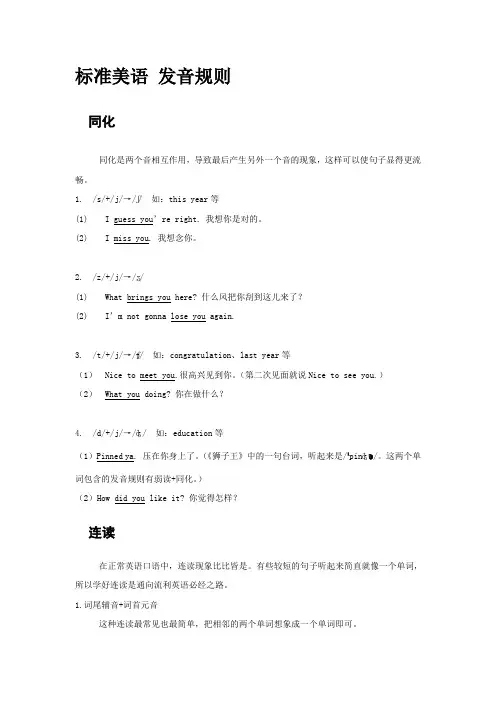
标准美语发音规则同化同化是两个音相互作用,导致最后产生另外一个音的现象,这样可以使句子显得更流畅。
1./s/+/j/→/ʃ/ 如:this year等(1)I guess you’re right. 我想你是对的。
(2)I miss you. 我想念你。
2./z/+/j/→/ʒ/(1)What brings you here? 什么风把你刮到这儿来了?(2)I’m not gonna lose you again.3./t/+/j/→/ʧ/ 如:congratulation、last year等(1)Nice to meet you.很高兴见到你。
(第二次见面就说Nice to see you.)(2)What you doing? 你在做什么?4./d/+/j/→/ʤ/ 如:education等(1)Pinned ya. 压在你身上了。
(《狮子王》中的一句台词,听起来是/ˈpinʤə/。
这两个单词包含的发音规则有弱读+同化。
)(2)How did you like it? 你觉得怎样?连读在正常英语口语中,连读现象比比皆是。
有些较短的句子听起来简直就像一个单词,所以学好连读是通向流利英语必经之路。
1.词尾辅音+词首元音这种连读最常见也最简单,把相邻的两个单词想象成一个单词即可。
(1)I’m so fed up with him. 他让我烦透了。
(2)I’ve already made up my mind. 我意已决。
(3)That is so gross [ɡrəus].太俗了。
(4)Turn on the juice. 合上开关,恢复通电。
(juice也有电的意思)2.词尾元音+词首元音A:以/u/、/ʊ/、/au/、/o/结尾的单词与跟在后面的元音连读时,两个元音之间加上一个较轻的/w/,这样过渡就会很自然。
(1)Just do it. 尽管去做吧!(2)It’s snowing. 下雪了。
人教版九年级英语Unit 2 同步课文听力和翻译Unit 2 I think that mooncakes are delicious.Section A1bListen and circle T for true or F for false.Mary: What a great day!Bill: Yes, it was really fun!Mary: What did you like best?Bill: I loved the races! They were really interesting to watch. How fantastic the dragon boat teams were!Mary: Yes! And look at the colors of the boats. How pretty they were!Bill: I agree! But I guess it was a little too crowded.Mary: I don’t know…I kind of like to have more people around. It makes things more exciting.Bill: That’s true. Oh, and I really liked eating zongzi.Mary: Oh, me too! The sweet ones are my favorite.Bill: I wonder if they’ll have the races again next year.Mary: Of course! They have them every year.Bill: Then I believe that I’ll be back again next year to watch the races!Mary: Me, too!1b 听录音,正确的圈T,错误的圈F。
Lesson 1 Welcome to Daily tips on Learning English. Today's tip is on distinguishing “can” and “cannot” in spoken American English. “Cannot” is usually contracted to “can't”. So many learners of English assume that in order to distinguish between “can” and “can't”, one must listen for the final “t” sound /t/. And when speaking, one must pronounce final …t‟ sound /t/ clearly. However, this is not in fact how native speakers distinguish “can” and “can't”. People do not say …I `can drive a car, but I can‟t drive a motorcycle.‟ People say …I can `drive a car', but I `can't drive a motorcycle.‟ The difference between “can” and “can't” is in stress. “Can” is not stressed, the verb after it is. “Can't” is stressed. The verb after it is not.Also since …can‟ is not stressed, the vowel is reduced to /a/, so “can” is actually pronounced “can”. Listen to another example. “I `can't go on Saturday, but I can `go on Sunday.” Did you hear the 't' sound? Did you notice the difference words being stress ed? Listening again. “I `can't go on Saturday, but I can `go on Sunday.” If you want to understand whether someone is saying he can or can't do something, you have to be listening for a stressed “can't” or a verb stressed after “can”. What does this mean? “I can `speak Japane se, but I `can't speak Taiwanese.” That's right, I can speak Japanese, but I cannot speak Taiwanese. When you are speaking it is very important that you follow this rule too. When learners of English say I `can help you, native speakers often unsure what i s meant because of improper stress. So remember, you can stress “can't”, but you `can't stress “can”.This has been today's tip on learning English. Tune in tomorrow for another tip.Lesson 2 Welcome to Daily Tips on Learning English. Today‟s tip is on ho w syllable stress can affect the meaning of words. Remenber that stressed syllables are said louder and are lengthened, and unstressed syllables are pronounced more softly, and often have the vowel sounds reduced. Sometimes, this difference can be the difference between a verb and a noun, or an adjective. There are at least 14 pairs of words in which syllable stress alone makes this difference. Some examples include `addict, a`ddict, `convict, con`vict, `perfect, per`fect. Each time the second syllable is stressed, the word is a verb. When the first syllable is stressed, the word is either a noun or an adjective. Let‟s look some examples more closely. `Permit, per`mit, a `permit is a noun, it is a piece of paper which authorizes you to do something. For instance, a fishing `permit allows you to go fishing. Per`mit is a verb. It means to allow. For instence, fishing isn‟t per`mitted here without a `permit.Another example is `perfect, per`fect. `Perfect is an adjective. It means 100% correct, no mistakes or errors. The verb is per`fect, it means to make something perfect. For example, “I want to per`fect my English” means “I want to make my English perfect”. Make sure you stress the right syllable. It can be the differece between different parts of speech. This has been today‟s daily tip. Till then, tomorrow, for another tip on learning English.Lesson 3 Welcome to Daily Tips on Learning English. Today‟s tip is on how different vowel lengths are used to differentiate words ending in voiced and voiceless consonants. Let‟s take an example. There‟s something in my eyes. There‟s something in my ice. The last words in the examples, eyes and ice differ in 2 ways. One difference is the word eyes end with the sound “z”, and ice end with the sound “s”. The other difference in the pronunciation of “eyes” and “ice” is how the vowel sound “ai” is pronounced. In the word “eyes”, it is longer. In the word “ice”, it is very short.Listen to the examples again, and note that the final consonant sound is not as clear as th e difference in the length of the vowel. There‟s something in my eyes. There‟s something in my ice. Listen again. There‟s something in my eyes. There‟s something in my ice. Listen to some other examples of words th at are identical except for the final cons onants and the vowel length. Cap, cab, plate, played, seat, seed. Today‟s tip is to pay more attention to the length of vowels, as this difference is very important in distinguishing some words. Till then, tomorrow, to another tip on learning English.Lesson 4 Welcome to daily tips on learning English. Today‟s tip is on sound linking.Although in written English, there‟re spaces between every word, in spoken English there‟re always never (1)pauses between words. In order to understand spoken English, it i s (2)essential to understand how this linking is done. Today let‟s (3)concentrate on the most common sound linking situation. Whenever a word ending in a consonant sound is followed by a word beginning with a vowel sound, the consonant sound is linked to the vowel sound as if they were part of the same word.Let‟s look at some examples. I‟d like another bowl of rice, please. First, note that although there‟re six words in the sente nce, all the words are linked together without pause. Listen again. I‟d like another bowl of rice, please. Now listen to how the words “like” and “another” are linked. “Like another”, “like-another”. “Like” ends in a consonant sound, and “another” begins with a vowel sound. So the “k” from “like” is linked to the “a” from “another”to produce “kanother”. Listen to the example sentence again. I‟d like another bowl of rice, please. In the sentence there is another example of a consonant being linked to a vowel. Abowl of, a bowl-of. It sounds like that you‟re saying the word “love”. Here‟s another example. I‟d love a bowl of rice. I‟d love a bowl of rice. This sound linking is probably the biggest problem for learners of English when they try to understand native speaker‟s talking. We‟ll talk more about sound linking in future daily ti ps, as this is an extremely import feature of spoken English. Today‟s tip is to link consonants to vowels which come after them. Till then, tomorrow, for another daily tip.Lesson 5 Welcome to Daily Tips on Learning English. Today‟s tip is on sound linki ng.Remember that although written English has spaces between every word, spoken English doesn‟t have pauses after every word. As a matter of fact, long strings of words are all linked together. And it is this linking, which often makes it difficult for learners of English to understand native speaker‟s talking. Today‟s tip is to notice how the “h” sound is often dropped in personal prono uns such as “he”, “him”, “his” and “her”. And when it is dropped, what is left is a vowel sound, and the vowel sound is a lways linked to the preceding word. Let‟s look at an example. Give her a book. Giv-er a book. Notice how the “h” is dropped and how “give her” become “giv-er”. Look at another example. Tell him to ask her. Tell-im to ask-er. Did you notice that “tell him” became “tell-im” and “ask her” became “ask-er”? This happens very frequently in spoken English, especially when “he” follows an auxiliary verb. For example, “what will he do?” becomes “What will-i do?” “Where will he go?” becomes “Where will-i go?” “When will he come?” becomes “When will-i come?” “Who will he meet?” becomes “Who will-i meet?” “How will he know?” becomes “How will-i know?” “Has he gone?” becomes “Has-i gone?” “Had he done it before?” becomes “Had-i done it before?” “Must he go?” becomes “M ust-i go?” “Can he do it?” becomes “Can-i do it?” “Should he leave?” becomes “Should-I leave?” it‟s important to accustom yourself to the dropped “h” sound in sound linking. This has been today‟s daily tip. Tune in tomorrow f or another tip on learning English.第6期(辅音连续)Welcome to Daily Tips on Learning English. Today‟s tip is on sound linking.When 2 identical or similar consonants are in a row, most sounds are not pronounced. For example, stop Peter. “stop” ends in the sound “p”, and “Peter” begins in the same sound. Together the words are linked as “sto-peter”. The words aren‟t pronounced stop Peter. To pronounce two identical sounds one after another, would sound like someone stuttering. English words are always linked smoothly. Similar but not identical sounds such as voiced and voiceless pairs of consonants are also linked in this way. For example, it‟s a big cake. “big” begins in the sound “g”, cake begins with the sound “k”. “k” and “g” differ only in that “k” is voiceless and “g” is voiced. When they are next to each other in a phrase they‟re linked smoothly by not aspirating or pronouncing fully the first of the 2 sounds. Listen carefully as I read the example again. It‟s a big cake. Notice how the fi rst sound “g” is not released. If the pair of sounds is reversed, like in “I like goats.” it is the “k” sound which is not pronounced. Listen closely. I like goats. I like goats.There‟re 8 pairs of consonants that differ only in the presence or lack of vocal cord vibration. Listen as I give one example of sound linking for each pair.v, f : I love France. δ,θ: Let‟s bathe three times.z, s : She is Susan.з,∫: The garage should be cleaned. dз,t∫: He has a huge chin.b, p : Put the cap back on.d, t : Dad told me. k, g : I like Gavin. (? )It is important to include this type of sound linking in your speech if you want to achieve fluency. It is also important to be aware of how this linking affects how spoken English sounds. Otherwise you may not understand native speaker‟s speech. This has been today‟s daily tip. Tune in tomorrow for another on learning English.第7期(冠词“a”)Welcome to Daily Tips on Learning English. Today‟s tip is on using or omitting the English article “a” correctly.There‟s no single rule that explains how to choose whether you should use “a”, use “the” or not use any article at all. Sometimes the re‟s only one correct choice, and in other cases, different choices change the meaning of the sentence. Today let‟s discuss the most frequently occurring differences between using the article “a” and using no article. All English nouns can b e divided into 2 classes: those that are countable and those that are uncountable.It is the meaning of a noun as it is used in a sentence which determines whether it is countable or uncountable. For instance, in the sentence “She has long hair.”, “hair” is uncoun table.B ut in the sentence “There‟s a hair in my soup.”,” hair” is countable. This can create some interesting mistakes. For example,“I like a dog” does not mean 我喜欢狗, that should be “I like dogs.” If you say “I like dog”, that means you like to eat dog meat. If you say “I ate a hamburger”, that means 我吃了一个汉堡, but if you say “I ate hamburger”, that means you ate raw ground beef. If you say “I ate a cake‟, that means you ate a whole cake, which is very unlikely. You should have said, “I ate cake”, then it means you ate some cake.Notice how the use of the article “a” means that the noun it precedes is countable, and therefore you‟retalking about a whole one, an entire one. If you omit the article “a”, then it means that you can‟t count the noun it precede s, and therefore you are talking about a piece or a quantity or something. So remember to pay careful attention to whether nouns are being used to a countable or uncountable meaning, and be sure to use or omit the article “a” accordingly. This has been today‟s daily tip. Tune in tomorrow for another tip on learning English.第8期(冠词的用法与读音)Welcome to Daily Tips on Learning English. Today‟s tip is on using the articles“a”, “an” and “the” correctly.Every student of English has my sympathy in his struggles with the English articles. They are one of the most difficult parts of learning English. First of all, I urge you to do this. Listen to native speakers. When you listen, listen carefully, since the articles “the” and “a” are almost never emphasized, they do not stand out prominently in speech, but they‟re pronounced. You will have to train your ears so that you will recognize that the little sounds before certain words are articles, and not meaningless noises. Also, get in the habit of pronouncing the articles in the way native speakers do. As little sounds that are part of the word they precede. For instance, think of and say “the boy”as one word. Listen to this short sentence. The boy likes the girl. Say it naturally, the boy likes the girl. Did you notice how the articles are just small sounds linked to the nouns? Listen to another example. There is a pen on a desk in the classroom. Say it naturally, there is a pen on a desk in the classroom. Did you notice how all the sounds, especially articles are linked together? The article “an” is used before nouns beginning with a vowel sound, such as “an apple”. Notice how the “n” sound is linked to the word which follows it. Also notice that words that spelled with the letter “h” in the beginning such as “hour” also use the article “an” because the “h” isn‟t pronounced. So we say, “an-our”, not “a hour”. And some words spelled with the letter “u” in the beginning such as “unicycle” use the article “a” because the first sound is the“y” sound “j”. So we say, a unicycle, not an unic ycle.It‟s also important to note that the pronunciation of the article “the” changes to “δi :” before words beginning with a vowel sound. So we say “δi:” elevator, not “δэ”elevator.Another tip is, do not be misled by newspaper headlines, advertisements and titles of book and so forth. They frequently omit articles which are necessary in complete sentences in both spoken and written English. Knowing when to use “a”, when to use “the”, and when not to use any article at all is undoubtably one of the most di fficult aspects of learning English. We will talk about this topic more in an upcoming daily tip. Tune in tomorrow for another tip on learning English.第9期(句子中的重音)Welcome to Daily Tips on Learning English. Today‟s tip is on word stress on sentences.In general, it is true that content words are stressed whereas function words are not stressed. Content words usually convey the meaning of the sentence. Function words make the sentence grammatically correct. Content words are: nouns, main verbs, adjectives, adverbs, this, that, these, those, and “wh-“ words, who, what, when, why, how, which. Function words are: articles, such as “a” and “the”; possessive adjectives, such as “his”, “my”, “your”; prepositions, such as “in”, “on”, “of”; conjunctions, such as “and”, “but”; personal pronouns, such as “ I”, “he”, “she”; the “be” verb, “am”, “is”, “are”, “was”, “were”; and auxi liaries, such as “do”, “does”, “did”.Tak e for example the sentence “Andrew brushes his teeth every morning.” The content word alone can convey the meaning of the sentence, namely “Andrew brushes teeth every morning.” The functional word “his” only makes the sentence grammatically correct. So “his” is unstressed, the other words are stressed. Why isn‟t “his” stressed? Because of course he brushes his teeth, not your teeth, or my teeth. This we would naturally assume. If, however, Andrew brushes someone else‟s teeth beside his own, then it would be very important to let your listener know that by stressing whose teeth he brushes. So, what words should be stressed? The simple answer is whatever words are important to the meaning you are trying to convey. if someone write the sentence on the board out of context and asks, “Which words are important? Which words should you stress?” You should answer, “That depends on the context.” Stress is used to let your listener know what is important to your message. If you stress words properly, your listener will have an easy time understanding your message. If you stress every word equally, then your listener will have to listen very carefully and try to guess the main point of your message. If your stress the wrong words, the listener will misunderstand your message or just feel very confused. So remember to stress the important words to your massage.This has been today‟s daily tip. Tune in tomorrow for another tip on learning English.第10期(断句)Welcome to Daily Tips on Learning English. Today‟s tip is on the u se of pauses in English speech.Although written English has spaces between every word, spoken English doesn‟t have pauses between each word, rather words are linked together. However, people do not normally speak without pausing at all. We do pause in speech. While in written English, there are periods, commas, semicolons and question marks. But we also pause in long sentences without punctuation marks. Let‟s lookat some examples. My mother listens to the radio in the evening. This sentence can be said without pausing, because it isn‟t very long. But if I were to pause, I would say, “My mother/ listens to the radio/ in the evening.” Why? Because pauses come betwee n thought groups----groups of words that express one thought.For example, “in the evening” is a thought group. Let‟s make the sentence longer. My mother listens to the radio in the eveni ng, plays tennis in the afternoon, and cleans the house in the morning. Now it is necessary to pause because the sentence is very long. Pauses come between thought groups, and help the listeners organize the information they hear. Listen to sentence again. My mother listens to the radio in the evening, plays tennis in the afternoon, and cleans the house in the morning. If you pause in the wrong places, listeners will have a harder time organizing the information. Listen to the sentence read again with improper pausing. My mother listens to the radio in/ the evening, plays tennis in /the afternoon, and cleans the/ house in the morning. Now the sentence is almost impossible to understand, so remember to pause between thought groups, to help your listeners easily organize what they hear.This has been today's tip on learning English. Tune in tomorrow for another tip on learning English.第11期(定语从句前的停顿)Welcome to Daily Tips on Learning English. Today‟s tip is on when to use p auses before adjective clauses.Let‟s take an example. In the sentence “My sister who lives in San Francisco is a doctor”, the adjective clause is “who lives in San Francisco”. It describes my “sister”. There‟s no pause before the adjective clause. So, it means that I have mor e than one sister, and the one who lives in San Francisco is doctor. There‟s a pause after an adjective claus e because it is a long sentence. But there can be no pause in the group of words “my sister who lives in San Francisco”. Because this is one idea or thought g roup. Listen to the sentence again. “My sister who lives in San Francisco is a doctor.” The same w ords used in that sentence have a different meaning if there‟s a pause before the adjective clause “who lives in San Francisco”. Listen to the new sentence. “M y sister, who lives in San Francisco, is a doctor.” Now there‟s a pause before, and a pause after the adjective clause, and in writing, there now is a comma before and a comma after the adjective clause. This sentence means that I have only one sister. She is a doctor, and by the way, she lives in San Francisco. The information conveyed by who lives in San Francisco is not necessary to understand whom I am talking about, as I only have one sister. I just added it in passing.If you say, “My girl friend who drives a BMW is a good dancer.” You‟re saying that you have more than one girl friend. “My boss w ho is very generous gives me a raise every year” means I have more than one boss. “Hawaii which is an island in the Pacific is a poplar tourist spot” means there‟s another Hawaii not in the Pacific. So remember to pause before and after adje ctive clauses o nly when it is referring to something or someone of which there‟s only one.This has been today‟s daily tip on learning English.第12期(问句的语调)Welcome to Daily Tips on Learning English. Today‟s tip is on the intonation of questions.Remember that intonation is the rising and falling of the pitch of your voice. So “she‟s here.” is a statement, but “she‟s here?” is a question. But it isn‟t true that all questions have a rising intonation. Today, let‟s just look at the intonation of three ty pes of questions: “Yes/No” questions, “Wh-” questions and choice questions.“Yes/No” questions have a rising intonation. “Wh-”qusetions have a falling intonation. And choice questions have a rising intonation for every choice except the last choice, which has a falling intonation.“Yes/No” questions such as “Do you like Taiwan?” “Can you speak Chinese?” have a rising intonation. The listener must answer either “yes” or “no”. “Wh-” questions start with the words “who”, “what”, “where”, “when”,” why”, “which” and “how”. “Wh-” questions have a falling tone. For example, “What time is it??” “Where do you live??” Don‟t say “What time is it??” “Where do you live??” In choice questions, the listener is expected to choose one item from several. For example, “Would you like juice, Coke, Tea or coffee?” A rising tone is used for every choice except the last, which has a falling tone. Listen to another example. “Do you like basketball, baseball, soccer or football?”. So remember that “Yes/No” questions, “Wh-” questions, and choice question ha ve different intonation patterns, and make sure to intone them properly.This has been today‟s daily tip on learning English. Tune in tomorrow for another tip第13期(是YES还是NO)Welcome to Daily Tips on Learning English. Today‟s tip is on answering “Yes/No” questions correctly.In English, “Yes” is always followed by affirmative statements. “No” is always followed by negative statements.This means you can‟t say, “Yes, I haven‟t eaten dinner yet.” Or “No, I did my home work.” Chinese allows this, but English does not. There‟re different kinds of “Yes/No” questions. Simple “Yes/No” questions such as “Do you speak English?” “Are you hungry?” pose no problem. But negative questions such as “Don‟t you speak English?” “Aren‟t you hungry?” require the same answers. “Yes, I do.” “No, I don‟t.” or “Yes, I am.” “No, I‟m not.” Chinese learners of English are often misled by negativequestions, and answer, “Yes, I don‟t speak English.” Or “Yes, I‟m not hungry.” by accident. Another type of “Yes/No” questions is to use a rising intonation with a statement. For example, you ask a Chinese person, “Did you eat dinner?” and he says, “No, I didn‟t.” You‟re surprised, so you ask, “You didn‟t eat dinner?” and he answers, “Yes.” instead of “No”. Don‟t use “yes” to mean “是的”. You should say, “That‟s correct.” In the example above, “Yes” means “Yes, I ate dinner.” Not “Correct, I didn‟t eat dinner. Let‟s look at another example. I think that all Chinese people like to eat rice. So, when my Chinese friend tells me that he ne ver eats rice, I was very surprised, and I ask, “You don‟t like to eat rice?” and he answers, “Yes.” This is wrong. Because i n English, you can not say, “Yes, I don‟t like to eat rice.” He should answer, “No.” or “That‟s correct.” So remember, “Yes” mu st b e followed by affirmative statements, and “No” must be followed by negative statements.This has been today‟s daily tip on learning English. Tune in tomorrow for another tip.第14期(“t”的发音)Welcome to Daily Tips on Learning English. Today‟s tip is on the pronunciation of the letter “t”.Of course the letter “t” is usually pounced “t”. But you may have noticed that in fluent speech, native speakers sometimes pronounced the “t” as “d”. That happens when the “t” comes between two voiced sounds.Do you know what sounds in English are voiced? Well, there‟re 15 voiced consonant sounds in English. b, d, g, m, n, ɡ, z,δ, l, r, dз,з,j,w. Also, all vowel and diphthong sounds in English are voiced. So let‟s look at some examples of words in which the “t” may be pronounced “d”.No.1 “matter”. “matter” is often pronounced “mader” as in “What‟s the matter?”No.2 “atom”. “atom” is often pronounced “adom” as in “The first atom bomb was dropped on Hiroshima.”No.3 “twenty”. “twenty” is often pronounced “twendi” as in “That will be twenty dollars, please.”No.4 “little”. “little” is often pronounced “liddle” as in “He got a little angry.”No.5 “city”. “city” is often pronounced “cidi” as in “Did you grow up in the city or the country?”No.6 “butter”. “butter” is often pronounced “buder” as in “Pass the butter, please.”When people speak slowly or emphatically, however, they usually pronounce the “t” like “t”, not like “d”. Also, a “t” does no t sound li ke “d” when it comes before a stressed vowel as in “return”.This has been today‟s daily tip on learning English. Tune in tomorrow for another tip第15期(助动词的强调)Welcome to Daily Tips on Learning English. Today‟s tip is on when to stress auxiliary verbs. Although auxiliary verbs are not usually stressed, when we want to strongly emphasize a verb, we stress the auxiliary verb. And if there‟s no auxiliary verb, we add one. These sentences are called emphatic sentences. For example, compare the sentences “He‟s done his home work” and “He has done his home work.” Usually we would say, “He‟s done his homework.” And the auxiliary verb “has” would not be stressed. But if we want to emphasize the meaning of “has done”, we stress the auxiliary verb “He has done his homework.” This is an emphatic sentence. Sentences which don‟t usually contain an auxiliary verb has an auxiliary ve rb in emphatic sentences, and it is always stressed. Emphatic sentences are usually used after someone has expressed the opposite meaning. For example, “-You didn‟t finish your homework.” “-I did finish my homework.” “-Maybe she doesn‟t know how to drive.” “-On the contrary, he does know ho w to drive.” “-You don‟t speak Chinese, do you?” “I do speak Chinese. I just wanted to give you s ome practice speaking English.”Did you notice how I said “I did finish” instead of “I finished”, and “she does know” instead of “she knows”, “I do speak” instead of “I speak”. The auxiliary verbs “did”, “does” and “do” were added to make the sentence more emphatic Be careful though not to use emphatic sentences unless you have a reason. Don‟t think that you can not learn the past tense of every verb and just s ay “I did eat”, “I did go” instead of “I ate” and “I went”. If you do this, your listeners will be confused. Your listeners will be thinking, “Why is that so important?” “Why is he stressing that so much?” This is not just another way of saying “I ate” and“I went”. You can only say “I did eat” and “I did go” when there‟s a reason for stressing this. So remember that although auxiliary verbs are not usually stressed, in emphatic sentences they are. This has been today‟s daily tip on learning English. Tune in tomorrow for another tip.第16期(附加问句的语调)Welcome to Daily Tips on Learning English. Today‟s tip is on the intonation of tag questions.Tag questions are used in two very different ways, and the difference depends on whether you use a rising or falling pitch at the end of the tag question. One way tag questions are used is to get your listener to agree with you about something you think is a fact, or must be true.If you think a lady is beautiful, you say, “She is beautiful, isn‟t she??” You expect the listener to say, “Yes, she is.” I f you know aman is not rich, you say, “He isn‟t rich, is he??” You expect the listener to say, “No, he isn‟t.” When you use a tag questio n to get your listener to agree, you must use a falling intonation. “She is beautiful, isn‟t she??” “He isn‟t rich, is he??”The other way tag questions are used is to ask for information. You don‟t know the answer, so you ask in a question. “She is beautiful, isn‟t she??” “He isn‟t rich, is he??” when you really don‟t know the answer, you should use a rising intonation. So, “He isn‟t rich, is he??” you know that he isn‟t rich. But, “He isn‟t rich, is he??” you don‟t know whether he is rich or not.Listen to another example. “You like Taiwan, don‟t you??” “You like Taiwan, don‟t you??”So remember to use the proper intonation when you use tag questions.This has been today‟s daily tip on learning English. Tune in tomorrow for another tip.第17期(自然的连续)Welcome to Daily Tips on Learning English. Today‟s tip is on sound linking.When certain sounds are linked together, the resulting sound is merely the combination of the two original sounds. For example, “one apple” is pronounced “one-napple”, and “four apples” is pronounced “four-rapples”. However, when other sounds are linked, there‟s a blending of the sounds. The sounds are linked smoothly without any break. For example, “two apples” are pronounced as if there‟s an additional “w” sound “w” in between the words. “two apples”, “two apples”. And when the words “three” and “apple” are linked, it sounds as if there were an additional “y”sound “i” between the words. “three apples”, “three apples”, “three apples”. This is because the sounds between the words are linked smoothly without any break. “two-w-apples”, not “two” “apples”. “three-i-apples”, not “three apples.” Pay careful att ention how sounds are blended together.Another good example is how words ending in a “t” or “d” sound “t” or “d” are linked to words beginning with a “y” sound “j”. For example, “Did you do it?” becomes “Did-you do it?” “Would you do it?” becomes “would-y ou do it?” Notice how together “did” “you” becomes “Did-you” and “would” “you” becomes “would-you”, and “do” “it” becomes “do-it”. Listen again as I give more examples. “Did you do it?” “Did you do it?” “Would you do it?” “Would you do it?” “Should you do it?” “Should you do it?” “Could you do it?” “Could you do it?”And also notice when a word ending in the “t” sound “t” is followed by a word beginning in a “y” sound “j”, you get the sound“t∫”. For example, “Can‟t you do it?” “Can‟t you do it?” “Didn‟t you do it?” “Didn‟t you do it?” “Couldn‟t you do it?” “Couldn‟t you do it?” “Shouldn‟t you do it?” “Shouldn‟t you do it?” “Wouldn‟t you do it?” “Wouldn‟t you do it?” “It‟s nice to meet you.” “It‟s nice to meet you.”Today‟s tip is to pay careful attention to how words are blended together, and how t he resulting sound is often very different from the original sounds. This has been today‟s daily tip. Tune in tomorrow for another tip on learning English.第18期(数字的发音)Welcome to Daily Tips on Learning English. Today‟s tip is on how to distinguish the numbers 13, 30, 15, 50, 14, 40 and so on.There‟s often a lot of confusion when people use these words. People often have to ask, “Did you say 16 or 60?” If you look at the sounds used in this pairs of words, you will notice that the only difference is in the final “n” sound “n” in the “-teen” words. Do people listen for this sound to tell them which word has been said? Do people say this sound loudly and clearly s o that people will know which word they are saying? Native speakers don‟t.They use different stress patterns to distinguish the words. In the “-teen” words, it‟s the last syllable which is stressed. In the numbers 30, 40, 50 and so on, it‟s the first syllable which is stressed. Also, when a syllable is stressed, that syllable‟s vowel sound is lengthened, and when a syllable isn‟t stressed, the vowel is shorter.Listen to me say the words, and notice the different syllables being stressed. 13, 30, 14, 40, 15, 50, 16, 60. Now listen to the length of vowels in the different syllables. I will exaggerate them first so it‟s easier to notice. 13, 30, 14, 40, 15, 50. N ow I will say them naturally. 13, 30, 14, 40, 15, 50, 16, 60, 17, 70, 18, 80, 19, 90. When you say these words, give specially care to stressing the right syllable, and to the length of the vowel sound in the stressed syllable. This has been today‟s tip on lea rning English. Tune in tomorrow for another tip.第19期(轻重音的重要性)Welcome to Daily Tips on Learni ng English. Today‟s tip is on stressed and unstressed syllables. Every English word has more than one syllable, and every complete sentence has at least one stressed syllable.A stressed syllable is pronounced more prominently than surrounding syllables. Simply put, we say it louder and we lengthen the vowel sound. Unstressed syllables are just the opposite. They are not as loud and the vowel sound is usually reduced. Vowel sounds are most often reduce d to “э”or to “ⅰ”. For example, in the word “purpose”, the first syllable is stressed, and the vowel of the second syllable can be reduced to either “э”as in “purpose” or “i” as in “purpose”. Let me give you a complete sentence. “I。
美语发音秘诀美语发音秘诀- -附1:/D/舌头轻点一下上颚,类似汉语拼音的/d/,或K.K.音标的/d/,但不是随便地把/d/这个音发出来,而是用舌头碰一下上颚,带出下一个音。
附2:'-'表示前后两个词要连读,所以音节被拆开,发音的时候不再以原来的单词为单位,而以连读产生的新音节为准。
连读两原则:辅音接辅音时,元音会接收前词词尾的辅音。
辅音接辅音时,前词词尾辅音消音,只念后词辅音词尾。
1、三个基本句型的口语读法be going to -- be gonnawant to -- wannahave got to -- ('ve) gotta2、重音变轻音(句子中次要单词的元音要弱读)3、后元接前辅(连着的两个单词,前面的单词词尾的辅音会和后面单词词首的原因产生连读)2、重音变轻音(句子中次要单词的元音要弱读)3、后元接前辅(连着的两个单词,前面的单词词尾的辅音会和后面单词词首的原因产生连读)4、y的变音(以/t/,/d/,/s/,/z/结尾的单词接以字母y开头的单词,会产生连读)5、轻辅变浊辅(以/t/结尾的单词碰上以元音开头的单词,发音会有变化)6、不发音的辅音(在一些情况下,前面单词的词尾辅音遇上后面以辅音开头的1/15页单词时,前面单词词尾的辅音不发音。
)7、h不发音(当he、him、his、her与前面单词连读时,/h/不发音;have的/h/不发音;where、what、when、which当中的/h/不发音)1、of的连读现象of后接辅音,f不发音,of后接元音,就与元音连读2、t的连读现象t与后面的元音连读时,就会念做轻/D/在字尾的t与不能连读的辅音相连时,不发音。
-ing在自然语速下的读法-ing在自然语速下的发音方法,称为'喉音'glottal stop。
发这个音的诀窍是将舌头顶在上颚(上排牙齿后方),由喉咙吐气发音,不过不是直接地吐气,而是顶出闷闷的声音来。
有道词典设置美式发音方法介绍有道词典是一个非常好用的在线翻译工具,除了提供词汇翻译和例句解释之外,还支持语音发音功能,帮助用户更好地学习和理解英语单词的发音。
有道词典中提供的发音包括美式发音和英式发音,用户可以选择自己喜欢的发音来学习。
本文将详细介绍有道词典如何设置美式发音方法,帮助用户更方便地使用该功能。
有道词典是一款功能强大的在线翻译工具,不仅支持中英文翻译,还提供了词汇的发音功能,让用户可以更好地学习和练习英语发音。
在学习英语的过程中,正确的发音非常重要,可以帮助我们更好地理解单词的含义和用法。
有道词典中提供了英式和美式两种发音选择,用户可以根据自己的需求选择适合的发音来学习。
在有道词典中设置美式发音的方法非常简单,下面将详细介绍具体的操作步骤:第一步:打开有道词典的网页或App,进入到需要查询的单词页面。
第二步:在单词页面中,可以看到该单词的释义解释和例句等内容,在单词右侧会有一个喇叭图标,点击该图标即可听到该单词的发音。
第三步:在弹出的发音窗口中,可以看到“发音”、“英式”和“美式”三个选项,点击“英式”即可选择英式发音,点击“美式”即可选择美式发音。
第四步:选择完美式发音后,再次点击喇叭图标即可听到该单词的美式发音。
通过上述操作步骤,用户就可以轻松设置有道词典的发音为美式发音,帮助自己更好地学习和练习美式英语发音。
在学习英语的过程中,不仅要注重词汇和语法的学习,还要重视发音的准确性,通过有道词典提供的美式发音功能,可以帮助用户更好地掌握单词的发音规则,提高自己的英语口语表达能力。
除了设置美式发音外,有道词典还提供了很多其他实用的功能,比如同近义词、反义词查询、词组搭配,以及词汇的构词法和词根词缀等相关知识。
用户可以根据自己的需求选择相应的功能来辅助学习和提高英语水平。
有道词典还支持离线翻译功能,让用户可以在没有网络的情况下继续使用翻译工具,非常方便实用。
总的来说,有道词典提供的美式发音功能非常实用,可以帮助用户更好地学习和练习美式英语发音。
连读、加音、爆破、同化、省音、弱读、浊化1. 连读:两个相邻单词首尾音素自然的拼读在一起,中间不停顿,被称为连读。
连读只发生在同一意群之内,即意思联系紧密的短语或从句之内。
相邻的两词在意义上必须密切相关,同属一个意群。
连读所构成的音节一般都不重读,只需顺其自然地一带而过,不可读得太重,也不可加音。
1)词尾辅音+词首元音,如:Standˆup.Notˆatˆall.Putˆitˆon, please.Please pickˆitˆupI'mˆanˆEnglish boy.Itˆisˆanˆold book.Let me haveˆa lookˆatˆit.Ms Black worked inˆanˆoffice.I called you halfˆanˆhourˆago.2)词尾不发音r或re+词首元音,词尾r发音/r/。
如farˆawaHereˆis a letter for you.Hereˆare fourˆeggs.whereˆis my cup?Whereˆare your brotherˆand sisterThey're my fatherˆand mother.I looked forˆit hereˆand there.Thereˆis a football underˆit5Thereˆare some books on the desk.there 与is 连读为theris [ðєә ris] there与are 连读为therare[ðєә ra注:当有意群进行停顿时不可连读。
当短语或从句之间按意群进行停顿时,意群与意群之间即使有两个相邻的辅音与元音出现,也不可连读。
如:Isˆit a hat orˆa cat?(hat 与or 之间不可以连读)Thereˆisˆa good book in my desk. (book 与in 之间不可以连读)Can you speakˆEnglish or French? (English 与or 之间不可以连读Shall we meet atˆeight or ten tomorrow morning? (meet 与 at,eight 与or 之间不可以连读)She opened the door and walkedˆin. (door 与and 之间不可以连读)2. 加音在连贯的语流中,人们往往会在两个元音之间加入一个外加音帮助发音,从而更加流畅地表达意思。
前言《美语怎么说( How to Say It in American English )》是美国之音中文部英语教学组推出的又一强档节目,教你用地道美语说时髦中文。
第一辑推出后受到了大家的喜爱,所以,第二辑来了!这本电子书又收入了十集节目的原文和原声,你可以一边听节目,一边看文字,轻松对照学习,省力又见效!看完本书,你将学会怎么用地道美语说“牛”、“海选”、“潜规则”、“窜红”、“人脉”......以及更多更多!Enjoy!第一课花美男Jessica在北京学汉语,她的中国朋友杨琳想知道“花美男”用美语怎么说。
杨琳: Jessica,你发现没有,现在有一种男人,皮肤比女人还好,比女人还爱打扮,穿得特时髦,都跟从偶像剧里走出来似的。
我们叫他们“花美男”,flower-pretty-man! 呵呵,我瞎翻的,美语中不会也有类似的称呼吧?Jessica: Actually, there IS an English equivalence. It's "metrosexual" m-e-t-r-o-s-e-x-u-a-l, metrosexual.杨琳: Metro-- "大城市",加上 Sexual-- "性别的"。
那 Metrosexual 跟中文里说的“花美男”指的是一种人吗?Jessica: Well, Metrosexual men live in big cities, know all the trendy places in town and pay great attention to their appearances.杨琳: 没错! 花美男就是住在大城市里的时尚达人,特别注重外表和打扮!要这么说,花美男就是 metrosexual man.Jessica: I guess being a metrosexual man means you're doing your homework on the latest trends. You need to be up-to-date on the hottest fashion!杨琳: Up-to-date on the hottest fashion? Fashion是时尚的意思,up-to- date 是跟上潮流,所以,up-to-date on the hottest fashion 就是“紧跟最新时尚”吧?Jessica: That's right! But 杨琳, I would say the real fashionable people are not those who follow the trends, but the trend setters!杨琳: Trend setters? T-r-e-n-d, trend 是趋势的意思,setter, s-e-t-t-e-r 是设定者,所以, trend setter 就是开创时尚的真正潮人!JESSICA: 没错! Now let's see what you've learned today!杨琳: 第一,注重打扮的“花美男”是 metrosexual men;第二,紧跟流行时尚是 be up-to-date on the hottest fashion;第三,领导时尚的潮人叫 trend setter!Donny 在北京学汉语,他的中国朋友吴琼想知道“窜红”用美语怎么说。
Donny: 吴琼,你看什么杂志呢, and who's the girl on the cover?吴琼: 这是最新一期的时尚周刊。
这个女生现在可红了。
你肯定猜不到,她是我高中时的好朋友! 拍了一部电影,一下就窜红了!Donny: No kidding! Introduce her to me! 对了,你说她“窜红”,什么意思啊?吴琼: 就是红得很快,suddenly 她就 famous了!Donny: I got it. She became famous overnight.吴琼: Overnight? 我知道,o-v-e-r-n-i-g-h-t, overnight 就是一夜之间。
To become famous overnight 就是“一夜成名”!Donny: That's right. You can also say "she's an instant hit". Instant is spelled i-n-s-t-a-n-t; hit is spelled h-i-t.吴琼: 哦,说一个人火速窜红还可以用 an instant hit.Donny: Yeah. In the case of this old friend of yours, you can say "her exceptional performance in the new movie made her an instant hit."吴琼: 对,我这个同学特别会演戏,电影一出来,她马上就窜红了。
Donny: 吴琼, I just thought of another way to put it---She catapulted to fame with her first movie! 吴琼: “Cata" 什么?怎么拼?Donny: Catapult, c-a-t-a-p-u-l-t, catapult, 有“弹弓”的意思. As a verb, it means to launch.吴琼: 我明白了,Catapult 是弹弓,所以 Catapult to fame,就是“一炮而红”! 我这个朋友演了一部电影就红了,所以说 She catapulted to fame with her first movie.Donny: That's right! Now, 吴琼, tell me what you've learned today!吴琼: 第一,to become famous overnight,一夜成名;第二,to be an instant hit, 火速窜红;第三:to catapult to fame,就是“一炮而红”!Donny在北京学汉语,他的中国朋友方方想知道“人脉”用美语怎么说。
Donny: 方方,听说你找到一个特好的实习?方方: 还不错啦! 现在竞争激烈,多亏我人脉广! 对了,美语里“人脉”怎么说啊?Donny: I think you can use the word "connection". C-o-n-n-e-c-t-i-o-n, connection.方方: 原来connection 就是“人脉”。
那我说自己路子野,人脉广,就是 I have a lot of connections. 对么?Donny: That's right. 你还可以说:I'm well-connected. C-o-n-n-e-c-t-e-d, connected。
方方: Connected? 这词儿我知道,意思是“连在一起”,所以 Well-connected 就是和很多人连在一起,也就是人脉广喽!Donny: Right! Connections are important. 有人说,找工作时,What really counts is not what you know, but who you know.方方: "Not what you know but who you know?" 不是看你知道什么,而是看你认识谁?我觉得,也不能这么绝对! 关系固然重要,但自己还是要有真本事!Donny: Certainly! So it should be "what you know plus who you know"!方方: 对,肚子里有学问,人脉又广,二者结合在一起,你就无敌了。
不过,像我这种刚出校门的,社交能力还不行,需要磨炼!Donny: Don't worry. You'll have plenty of time to work on your networking skills.方方: 哦! Networking skills 就是社交技巧。
Donny: Right. With strong networking skills, you'll develop more connections. 到时候,我找工作可得靠你帮忙了!方方: 哈哈,我期待这一天!Donny: 先别美! Tell me what you've learned today!方方: 第一,"人脉"在美语里就是 connection;第二,形容"人脉广"用 well-connected;第三,社交技巧,是 networking skills!Jessica 在北京学汉语,她的中国朋友杨琳想知道“海选”用美语怎么说。
杨琳: Jessica! 送你一张我的签名照!快拿着!Jessica: Your autograph? why do I want that?杨琳: 告诉你,我快成明星啦!Jessica: Really? You will be a super star? 你被张艺谋看中了?杨琳: 不是。
我参加“阳光女生”的海选,击败了众多对手......对了,海选你明白么?Sea selection! 谁都能参加! 也有人管它叫甄选。
Jessica: Sea selection? 哦,I see. In English, it's called "an open audition". Everyone can walk in the door, perform and compete, like American Idol.杨琳: 没错,就是那种!原来这叫"open audition". Open 开放的; Audition, a-u-d-i-t-i-o-n, audition 试演选拔,连在一起,Open audition, 就是“海选”或是“甄选”。
这么说,I am the winner of the open audition!Jessica: Well, I don't think you can call yourself a "winner", because more than one person get selected in an open audition to advance to the next round.杨琳: 也是,这次一共一百人过关,进入下一轮比赛。